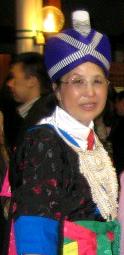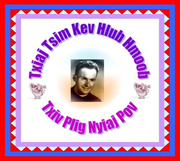Nyob zoo txhua leej txhua tus phoojywg sawv daws uas nyob rau tej chaw thaj yeeb, Hnub tim 28 lub 12 hlis ntuj 2009 peb haiv Hmoob Thoj Nam tau raug xa rov qab mus sab los tsuas teb tag nrho lawm, yog li hnub no peb mus teev ntuj peb yuav nco ntsoov thov ntuj rau cov kwv tij Hmoob uas poob zoo raug tsim txom tau 30 tawm xyoo los no lawm, muab xam mas lawv zoo nkaus li cov Is Xas Yees uas thaum ub mus poob zoo lawm, lawv tos tus cawm seej mus pab lawv yam nkaus li pej xeem Is Xas Yees. Tiam sis tus cawm seej twb los dhau tag lawm peb haiv Hmoob poob zoo yuam kev rau hav zoov hav tsuag thiaj tsis muaj tus qhuab qhia kev cai kom txhob txhawj txog lub neej ntiaj teb, niaj hnub no peb haiv Hmoob Thoj Nam thiaj tseem pheej quaj ntsia ntsoov lub ntuj tos tus cawm seej. Li no kuv thov kom nej cov niam cov txiv nco ntsoov thov ntuj kom Huab Tais Yesxus pub txiaj ntsim rau lawv cov me tub me nyuam thiab kom lawv tau chaw nyob kaj siab li peb txhua tus niaj hnub no thiab mog. Txawm tsis nrog luag muaj teb muaj chaw los txhob tu siab rau lub ntuj, vim tias ntiaj teb tsis yog peb nteeg tug nws yog Tswv Ntuj li xwb, Tswv Ntuj twb pub luag lwm heiv neeg pej xeem txais peb nyob luag av yam li peb kuj tau zoo lawm hov ntau thiab mas peb yuav nqa tes txaug yim luag li ntxi ua Ntuj tsaug thiab thov ntuj tsis tseg pab rau cov tseem tsis tau chaw nyob tiaj tus. Peb teb peb chaw yog nyob saum Ntuj nrog Huab Tais Yesxus, muaj hnub nws yuav los coj peb nrog nws nyob , nws teej nws tug nws yuav faib rau peb sib npaug li nws faib rau cov siab dawb siab zoo uas xub mus pem Ntuj lawm.
Thai soldiers supervise the deportation of thousands of Hmong refugees to Laos, December 28.
Thailand has expelled Monday, December 28th to Laos, more than four thousand Hmong asylum seekers, ethnic minority of South-Eastern Asia, which were housed in camps, some for more than thirty years. An act unanimously condemned by the international community.
The Hmong say the risk of being subjected to ill treatment by the communist government of Laos. They were allied with the United States during the Vietnam War and many fled Laos in 1975 with the arrival in power of the Communist Party. But Bangkok considers the Hmong in Huay Nam Khao as economic migrants can not claim refugee status.
The Office of the United Nations for Refugees (UNHCR) urged the Thai government to stop the eviction and the European Union expressed "dismay". "We are stunned that this is currently happening, despite an earlier call for the Thai authorities cancel the eviction, said Adrian Edwards, a spokesman for the UNHCR. In a statement, the EU believes that the measure was "contrary to international law".
Sunday, Washington had asked Thailand to cancel the transaction. "We deeply regret this serious violation of international humanitarian principles which Thailand had long been a champion," said U.S. State Department. The U.S. diplomat also called on Sunday to Laos' Hmong handle returned against their will in a humane manner, to allow access to international inspectors, and to facilitate the resettlement of deportees. "
JOURNALISTS ACCESS PROHIBITED
Monday late afternoon, Prime Minister of Thailand, Abhisit Vejjajiva, said the operation had gone well and there was no resistance. He said he had received assurances from the Lao government that they would be treated well and that UNHCR had access to them, unlike what happened in Thailand. Laos, the Hmong who was awaiting deportation in the early evening and prepared "temporary shelters" denies him, accusations of systematic persecution.
The journalists were denied access to the camp and must remain at 12 kilometers of the site. For two years, the press did not have access to the camp. In May, the NGO Doctors without Borders, the main group coming in to help Hmong, was removed from the site after having denounced their treatment was inflicted. According to oversee the military operation, the media were kept away to avoid that the Hmong do not attempt "to draw attention to their status [to] mutilate.





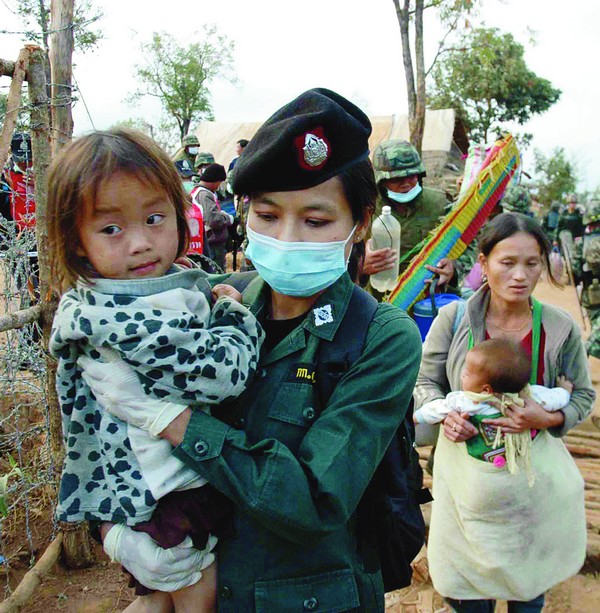

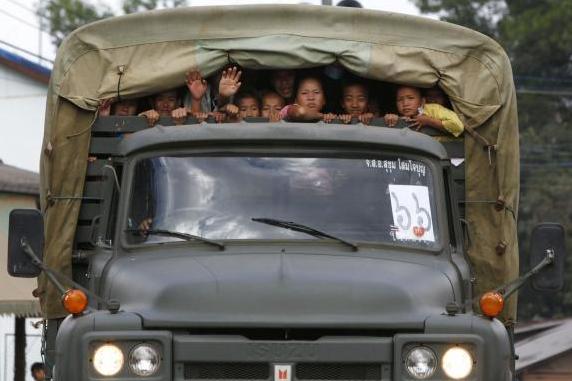


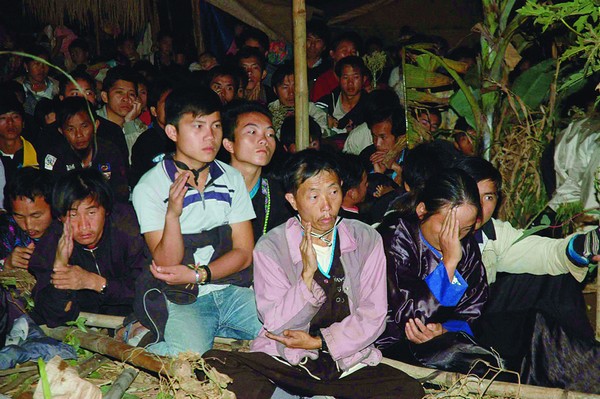


Des militaires thaïlandais surveillent l'expulsion de milliers de réfugiés hmong vers le Laos, le 28 décembre.
La Thaïlande a expulsé, lundi 28 décembre vers le Laos, plus de quatre mille demandeurs d'asile hmong, une ethnie minoritaire d'Asie du Sud-Est, qui étaient hébergés dans des camps, pour certains depuis plus de trente ans. Un acte unanimement condamné par la communauté internationale.
Les Hmong affirment risquer d'être soumis à de mauvais traitements de la part du gouvernement communiste laotien. Ils s'étaient alliés aux Etats-Unis durant la guerre du Vietnam et nombre d'entre eux ont fui le Laos en 1975 à l'arrivée au pouvoir du parti communiste. Mais Bangkok considère les Hmong de Huay Nam Khao comme des immigrés économiques ne pouvant pas prétendre au statut de réfugiés.
Le Haut-Commissariat de l'ONU pour les réfugiés (HCR) a appelé le gouvernement thaïlandais à arrêter l'expulsion et l'Union européenne s'est dite "consternée". "Nous sommes abasourdis que cela soit en train de se passer", en dépit d'un précédent appel pour que les autorités thaïlandaises annulent les expulsions, a déclaré Adrian Edwards, un porte-parole du HCR. Dans un communiqué, l'Union européenne estime que la mesure était "en contravention avec le droit international".
Dimanche, Washington avait demandé à la Thaïlande d'annuler l'opération. "Nous regrettons profondément cette grave violation des principes humanitaires internationaux dont la Thaïlande s'était longtemps faite le champion", a déclaré le département d'Etat américain. La diplomatie américaine a également appelé dimanche le Laos à "traiter les Hmong renvoyés contre leur gré de façon humaine, à autoriser l'accès d'inspecteurs internationaux, et à faciliter le relogement des expulsés".
LES JOURNALISTES INTERDITS D'ACCÈS
Lundi en fin de journée, le premier ministre thaïlandais, Abhisit Vejjajiva, a affirmé que l'opération s'était bien passée et qu'il n'y avait pas eu de résistance. Il a ajouté avoir reçu l'assurance du gouvernement laotien qu'ils seraient bien traités et que le HCR aurait accès à eux, contrairement à ce qui s'est passé en Thaïlande. Le Laos, qui attendait les Hmong expulsés en début de soirée et a préparé des "abris temporaires" nie, lui, systématiquement les accusations de persécution.
Les journalistes se sont vu refuser l'accès au camp et doivent rester à 12 kilomètres du site. Depuis deux ans, la presse n'a pas accès au camp. En mai, l'ONG Médecins sans frontières, principal groupe venant en aide aux Hmong, s'est retirée du site après avoir dénoncé le traitement qui leur était infligé. Selon les militaires qui supervisent l'opération, les médias ont été tenus à l'écart pour éviter que des Hmong ne tentent "d'attirer l'attention sur leur statut en [se] mutilant".
 Thov Huab Tais Ntuj yog Leej Txiv muaj Hwj Huam tas nro, tus tsim lub ntuj lub teb kom pab nrog pom haiv Hmoob Thaj Nam txoj kev quaj ntsuag tsis tseg, Kom muaj ib hnub lawv paub Tswv Ntuj thiab Leej Ntuj plig yuav los pab txhawb lawv kom dim ntawm txoj kev ntxhov siab quaj ntsuag. Tswv Ntuj tus nyob siab koj cog lus tias koj yuav pub txiaj ntsim rau peb tseem nyob ntiaj teb no, yog li hnub no kuv thov koj txais heiv neeg me me tsawg tsawg ntawv los ua koj ntiag koj tug tib si, thov koj ua kom lawv tau nyob thaj yeeb peb cov Txiv Plig thgiaj tau kev mus siab xyuas lawv thiab thiaj tau qhia koj lub moo zoo koj lo lus zoo pub rau lawv yam li thaum ub koj pub rau haiv Hmoob Nyob Roob NYuj Qus thiab mog. Thov kom Huab Tais Ntuj nco ntsoov nws lo lus thiab yuav ua raws li nws lo lus mus tag txhiab niaj tim puas xyoo, kom Tswv Ntuj ntoo koob meej mus ib txhiab ib txhis.
Thov Huab Tais Ntuj yog Leej Txiv muaj Hwj Huam tas nro, tus tsim lub ntuj lub teb kom pab nrog pom haiv Hmoob Thaj Nam txoj kev quaj ntsuag tsis tseg, Kom muaj ib hnub lawv paub Tswv Ntuj thiab Leej Ntuj plig yuav los pab txhawb lawv kom dim ntawm txoj kev ntxhov siab quaj ntsuag. Tswv Ntuj tus nyob siab koj cog lus tias koj yuav pub txiaj ntsim rau peb tseem nyob ntiaj teb no, yog li hnub no kuv thov koj txais heiv neeg me me tsawg tsawg ntawv los ua koj ntiag koj tug tib si, thov koj ua kom lawv tau nyob thaj yeeb peb cov Txiv Plig thgiaj tau kev mus siab xyuas lawv thiab thiaj tau qhia koj lub moo zoo koj lo lus zoo pub rau lawv yam li thaum ub koj pub rau haiv Hmoob Nyob Roob NYuj Qus thiab mog. Thov kom Huab Tais Ntuj nco ntsoov nws lo lus thiab yuav ua raws li nws lo lus mus tag txhiab niaj tim puas xyoo, kom Tswv Ntuj ntoo koob meej mus ib txhiab ib txhis.
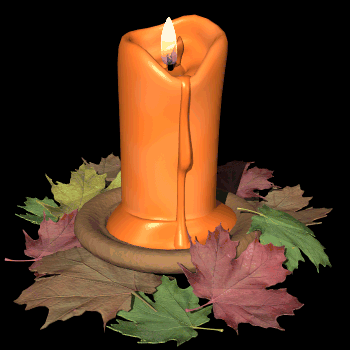
Thai soldiers supervise the deportation of thousands of Hmong refugees to Laos, December 28.
Thailand has expelled Monday, December 28th to Laos, more than four thousand Hmong asylum seekers, ethnic minority of South-Eastern Asia, which were housed in camps, some for more than thirty years. An act unanimously condemned by the international community.
The Hmong say the risk of being subjected to ill treatment by the communist government of Laos. They were allied with the United States during the Vietnam War and many fled Laos in 1975 with the arrival in power of the Communist Party. But Bangkok considers the Hmong in Huay Nam Khao as economic migrants can not claim refugee status.
The Office of the United Nations for Refugees (UNHCR) urged the Thai government to stop the eviction and the European Union expressed "dismay". "We are stunned that this is currently happening, despite an earlier call for the Thai authorities cancel the eviction, said Adrian Edwards, a spokesman for the UNHCR. In a statement, the EU believes that the measure was "contrary to international law".
Sunday, Washington had asked Thailand to cancel the transaction. "We deeply regret this serious violation of international humanitarian principles which Thailand had long been a champion," said U.S. State Department. The U.S. diplomat also called on Sunday to Laos' Hmong handle returned against their will in a humane manner, to allow access to international inspectors, and to facilitate the resettlement of deportees. "
JOURNALISTS ACCESS PROHIBITED
Monday late afternoon, Prime Minister of Thailand, Abhisit Vejjajiva, said the operation had gone well and there was no resistance. He said he had received assurances from the Lao government that they would be treated well and that UNHCR had access to them, unlike what happened in Thailand. Laos, the Hmong who was awaiting deportation in the early evening and prepared "temporary shelters" denies him, accusations of systematic persecution.
The journalists were denied access to the camp and must remain at 12 kilometers of the site. For two years, the press did not have access to the camp. In May, the NGO Doctors without Borders, the main group coming in to help Hmong, was removed from the site after having denounced their treatment was inflicted. According to oversee the military operation, the media were kept away to avoid that the Hmong do not attempt "to draw attention to their status [to] mutilate.













Des militaires thaïlandais surveillent l'expulsion de milliers de réfugiés hmong vers le Laos, le 28 décembre.
La Thaïlande a expulsé, lundi 28 décembre vers le Laos, plus de quatre mille demandeurs d'asile hmong, une ethnie minoritaire d'Asie du Sud-Est, qui étaient hébergés dans des camps, pour certains depuis plus de trente ans. Un acte unanimement condamné par la communauté internationale.
Les Hmong affirment risquer d'être soumis à de mauvais traitements de la part du gouvernement communiste laotien. Ils s'étaient alliés aux Etats-Unis durant la guerre du Vietnam et nombre d'entre eux ont fui le Laos en 1975 à l'arrivée au pouvoir du parti communiste. Mais Bangkok considère les Hmong de Huay Nam Khao comme des immigrés économiques ne pouvant pas prétendre au statut de réfugiés.
Le Haut-Commissariat de l'ONU pour les réfugiés (HCR) a appelé le gouvernement thaïlandais à arrêter l'expulsion et l'Union européenne s'est dite "consternée". "Nous sommes abasourdis que cela soit en train de se passer", en dépit d'un précédent appel pour que les autorités thaïlandaises annulent les expulsions, a déclaré Adrian Edwards, un porte-parole du HCR. Dans un communiqué, l'Union européenne estime que la mesure était "en contravention avec le droit international".
Dimanche, Washington avait demandé à la Thaïlande d'annuler l'opération. "Nous regrettons profondément cette grave violation des principes humanitaires internationaux dont la Thaïlande s'était longtemps faite le champion", a déclaré le département d'Etat américain. La diplomatie américaine a également appelé dimanche le Laos à "traiter les Hmong renvoyés contre leur gré de façon humaine, à autoriser l'accès d'inspecteurs internationaux, et à faciliter le relogement des expulsés".
LES JOURNALISTES INTERDITS D'ACCÈS
Lundi en fin de journée, le premier ministre thaïlandais, Abhisit Vejjajiva, a affirmé que l'opération s'était bien passée et qu'il n'y avait pas eu de résistance. Il a ajouté avoir reçu l'assurance du gouvernement laotien qu'ils seraient bien traités et que le HCR aurait accès à eux, contrairement à ce qui s'est passé en Thaïlande. Le Laos, qui attendait les Hmong expulsés en début de soirée et a préparé des "abris temporaires" nie, lui, systématiquement les accusations de persécution.
Les journalistes se sont vu refuser l'accès au camp et doivent rester à 12 kilomètres du site. Depuis deux ans, la presse n'a pas accès au camp. En mai, l'ONG Médecins sans frontières, principal groupe venant en aide aux Hmong, s'est retirée du site après avoir dénoncé le traitement qui leur était infligé. Selon les militaires qui supervisent l'opération, les médias ont été tenus à l'écart pour éviter que des Hmong ne tentent "d'attirer l'attention sur leur statut en [se] mutilant".
 Thov Huab Tais Ntuj yog Leej Txiv muaj Hwj Huam tas nro, tus tsim lub ntuj lub teb kom pab nrog pom haiv Hmoob Thaj Nam txoj kev quaj ntsuag tsis tseg, Kom muaj ib hnub lawv paub Tswv Ntuj thiab Leej Ntuj plig yuav los pab txhawb lawv kom dim ntawm txoj kev ntxhov siab quaj ntsuag. Tswv Ntuj tus nyob siab koj cog lus tias koj yuav pub txiaj ntsim rau peb tseem nyob ntiaj teb no, yog li hnub no kuv thov koj txais heiv neeg me me tsawg tsawg ntawv los ua koj ntiag koj tug tib si, thov koj ua kom lawv tau nyob thaj yeeb peb cov Txiv Plig thgiaj tau kev mus siab xyuas lawv thiab thiaj tau qhia koj lub moo zoo koj lo lus zoo pub rau lawv yam li thaum ub koj pub rau haiv Hmoob Nyob Roob NYuj Qus thiab mog. Thov kom Huab Tais Ntuj nco ntsoov nws lo lus thiab yuav ua raws li nws lo lus mus tag txhiab niaj tim puas xyoo, kom Tswv Ntuj ntoo koob meej mus ib txhiab ib txhis.
Thov Huab Tais Ntuj yog Leej Txiv muaj Hwj Huam tas nro, tus tsim lub ntuj lub teb kom pab nrog pom haiv Hmoob Thaj Nam txoj kev quaj ntsuag tsis tseg, Kom muaj ib hnub lawv paub Tswv Ntuj thiab Leej Ntuj plig yuav los pab txhawb lawv kom dim ntawm txoj kev ntxhov siab quaj ntsuag. Tswv Ntuj tus nyob siab koj cog lus tias koj yuav pub txiaj ntsim rau peb tseem nyob ntiaj teb no, yog li hnub no kuv thov koj txais heiv neeg me me tsawg tsawg ntawv los ua koj ntiag koj tug tib si, thov koj ua kom lawv tau nyob thaj yeeb peb cov Txiv Plig thgiaj tau kev mus siab xyuas lawv thiab thiaj tau qhia koj lub moo zoo koj lo lus zoo pub rau lawv yam li thaum ub koj pub rau haiv Hmoob Nyob Roob NYuj Qus thiab mog. Thov kom Huab Tais Ntuj nco ntsoov nws lo lus thiab yuav ua raws li nws lo lus mus tag txhiab niaj tim puas xyoo, kom Tswv Ntuj ntoo koob meej mus ib txhiab ib txhis.

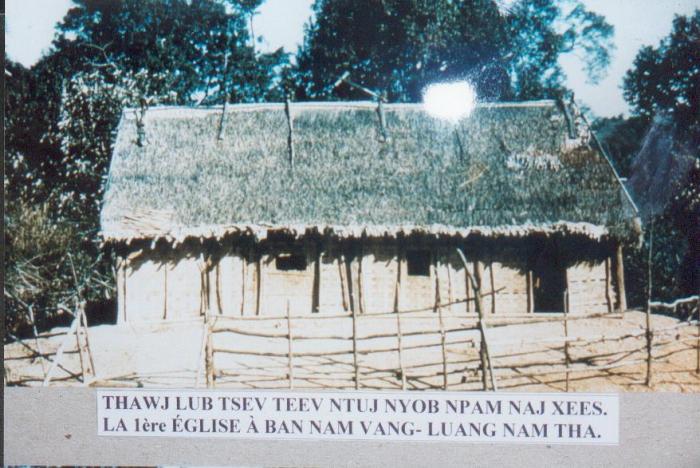



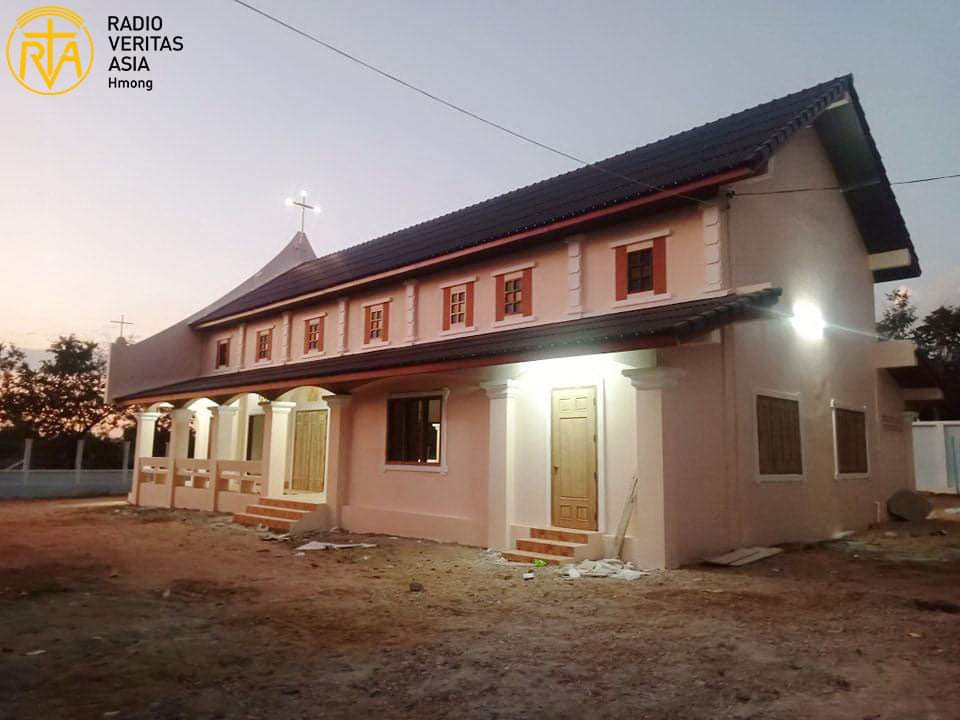









 Yog koj tso siab rau Yesxus lub siab ntshiab, nws yuav ua koj siab kaj lug
Yog koj tso siab rau Yesxus lub siab ntshiab, nws yuav ua koj siab kaj lug 





 Vim li cas peb cov Kas Tos Liv ntseeg tias NIAM MAB LIAB yog TSWV NTUJ Niam? caws nej mus nias nyeem tau hauv no.
Vim li cas peb cov Kas Tos Liv ntseeg tias NIAM MAB LIAB yog TSWV NTUJ Niam? caws nej mus nias nyeem tau hauv no. Leej Tshiab Mis Kas Ees thov koj pab tuav thiab saib xyuas peb lub Vas Sab Hmong Catholique ntawm no kom ruaj nrees.
Leej Tshiab Mis Kas Ees thov koj pab tuav thiab saib xyuas peb lub Vas Sab Hmong Catholique ntawm no kom ruaj nrees.
